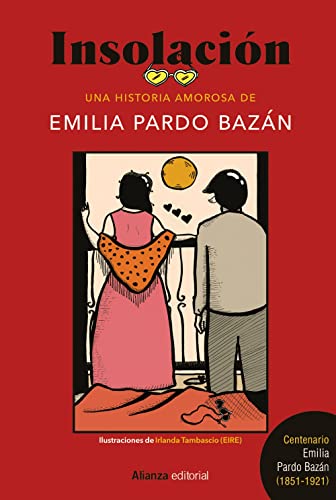
Insolation was published in 1889. It is a novel that caused discomfort because it was judged daring. A story written by a woman, Emilia Pardo Bazán, which tells how a young widow begins a love story with a man younger than her. The novel has recently been published in an illustrated publication that has once again highlighted this excellent portrait of female sexual desire.
Pardo Bazán published Insolation after being recognized as a writer. But many of his male colleagues were his own detractors of his work. It was still early to dare to write a love affair with the characteristics of the Marquise de Andrade and Diego Pacheco.
Sunstroke: love affair of a young widow
Morality and sexual desire
The story begins in media res, that is, with the main action already elapsed. From the thoughts and feelings of a 32-year-old widow we will learn what happened the day before.. Asís Taboada, the Marchioness of Andrade, wakes up after a night of alcohol with a headache and begins to remember the events of the past night. In a flow of ideas, the reader witnesses the internal discussion that occurs in the protagonist, drowned by morality and eager to live the desire that a new man, Diego Pacheco, awakens in her. They both met during a fair in San Isidro in the XNUMXth century, in which the young man hopelessly seduced the marchioness..
Insolation It is the story of a woman who, after being widowed, feels desire and attraction for another man. When the marchioness meets Diego Pacheco she will experience the awakening of her body and sexual needs arise, always forbidden to women. The scandal of the time was inevitable. Pardo Bazán shows how women could not live freely or feel their bodies, since they had always been repressed. Therefore, it is a novel ahead of its time where it is clear that men and women were not in the same conditions. The woman was an incorruptible being who had to guard against any amoral situation that disturbed the home. Of course, dealing with female sexuality was inconceivable; They could not get out of the narrow margins in which the system had separated them.. Men were judged in a very different way, as they could associate with different women without fear of being repudiated.

Heat and prejudices
Emilia Pardo Bazán creates a much more intimate atmosphere in this novel than in her previous works. She leaves aside the naturalism that the author had always displayed to present deeper characters and a very well-drawn protagonist. It makes an in-depth development of Asís de Taboada to present a woman tormented by what she does not know exactly what she did the day before.. The alcohol, the hours of sunshine, seem to have played tricks on her and now she suffers from sunstroke. The author plays with having had an exaggerated outdoor exposure during the spring and the hours she has spent in the company of an attractive young man, a ladies' man of the time. There is a very consistent work on the inner world of women and the novel delves into the depths of the spirit.. This is what stands out about this text from the others signed by the Galician author.
Insolation It is a harsh statement about the prejudices of the time regarding the authentic sexual awakening of a woman who has lived by and for social conventions. and that after being widowed she has an experience that she would never have sought. Uncertainty, doubt, guilt, appear in an internal dialogue starring the Marchioness of Andrade, at the same time that an omniscient narrator presents the context that surrounds the female character. Likewise, the author flaunts her knowledge of other characters who inhabit her time and she develops a hypocritical context with different social classes that looked closely and judged the behavior and women's way of life: individuals stripped of carnal desire.

Conclusions
Insolation It is a XNUMXth century novel with a clear feminist claim about what it meant to be a woman, to discover oneself in body and spirit, and to enjoy one's own sexuality.. A novel well ahead of its time, both for its female protagonist and for the writer herself. A work that stands out for its literary quality, beyond the fact that the topic would have been obscenity for its time. Thanks to this book we can get to know a little more about Emilia Pardo Bazán, a woman who saw beyond her time and her condition as a woman, and who delved into other literary recesses other than the naturalism that was so relevant for her. her work.
About the author
Emilia Pardo Bazán was born in La Coruña in 1851. She belonged to a high-class family, so she enjoyed education despite her status as a woman. She became a cultured woman and the author of poetry, stories, essays and narratives. Although if she is known for something, it is for the success of her two greatest novels: The pazos de Ulloa y Mother nature. Likewise, it was His contribution to Spanish naturalism was especially relevant and, not without controversy, a series of articles were published on this topic, which were titled The burning question. Although she married, she separated, and for many years she maintained a relationship with Benito Pérez Galdós, an exponent of Spanish realism, and which was reflected in the numerous letters that both of them dedicated to each other.
She was a professor of Romance Literatures at the University of Madrid and always attacked the unequal situation in which women also found themselves in the highest spheres of society and intellectual groups. Pardo Bazán died in 1921.
